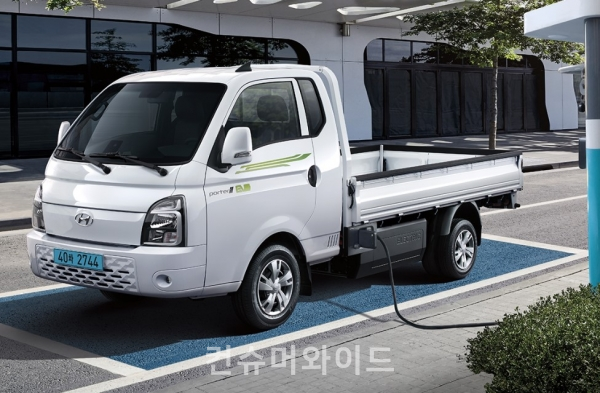
[Consumerwide_ HueSoung, Jun Reporter / Yohan, Bok Reporter] Commercial vehicles in the domestic market are rapidly changing. Diesel vehicles have been a major trend in the commercial vehicle industry because they carry a heavy load. Nevertheless, the by-product of diesel vehicles pollutes the environment. For this reason, the government is trying out various policies, including electric vehicle subsidies for vehicle owners. Consumers are changing as well. Customers who value the environment are choosing electric vehicles for commercial use.
On the 28th, referring to the Carisyou Data Lab and the Ministry of Land and Infrastructure, the sales record of electric vehicles for commercial use was insignificant.
Only 147 vehicles were sold in 2018. However, the record jumped every year. 1656 vehicles in 2019 and 15380 vehicles in 2020 were sold, which is a 105-fold increase in 2 years. The twofold growth continued until 2022, when it was 28897 in 2021 and 40574 in 2022. Considering the sales record in the first quarter of this year (15032), the increase rate might be the same by the end of the year.
In the same way, the number of commercial vehicles is rapidly increasing. The commercial electric vehicle took only 0.5% of the market in 2018. But it increased by 4.7% in 2019 and 32.9% in 2020. Since then, it has slightly decreased, recording 28.8% in 2021 and 24.7% in 2022. Yet, it is suspected to rebound to 44.0% during the first quarter. As if that proves it, 15032 commercial electric vehicles were sold during the first quarter, which is a 71.5% increase from the same quarter last year. (8766) Comparing the record of passenger electric vehicles during the first quarter to 19087 during the first quarter, which was only a 0.4% increase from the same quarter last year (19154), it seems quite contrasting.
So then, what type of vehicles would be leading the growth among commercial electric cars? Trucks and SE vehicles (special equipment vehicles) are leading the growth during the first quarter. In particular, the SE vehicles are built based on trucks, and remodeled for special purposes, such as vehicles with frozen conditions or public address systems. 12876 trucks were sold during the first quarter, which is a 74.9% increase from the same quarter last year (7360). 1381 SE vehicles were sold during the first quarter, which is a 73.3% (797) increase from the same quarter last year. 775 buses were sold, which is a 27.3% increase from the same quarter last year (609).
Because of the rate of change in commercial electric vehicles, individual owners seemed more active than businesses and corporations. The individual sales record, which was 10274 during the first quarter, has approached 68.3% of the entire record. Another word: seven commercial electric vehicles were sold to individuals among the 10 during the first quarter. This can be interpreted as meaning that private vehicles took the lead among commercial electric vehicle sales. During the first quarter, 14162 private vehicles were sold, which was 94.2% of total records. The cargo transportation vehicle took 2.9% (437), taxis 2.1% (323), and official vehicles 0.8% (120).
During the 1st quarter, vehicles for private use took 94.2% of total sales by recording 14162. The cargo transportation vehicle took 2.9% (437), taxis 2.1% (323), and official vehicles 0.8% (120).
Korean vehicles are taking the lead in the domestic commercial electric vehicle market. Nevertheless, recently, Chinese commercial electric vehicles have expanded into the domestic market. During the first quarter, Hyundai and Kia were solely playing in the Korean commercial electric vehicle market. In particular, models from Hyundai Motors ranked first, third, and fifth in the first quarter sales competition. Meanwhile, for the imported commercial electric car competition, the top 5 were all taken by Chinese vehicles, whereas the European vehicles were not even able to step in. Earlier, European vehicles had been leading the overall commercial vehicle market. The sales record of Chinese commercial electric vehicles is minor. However, I predict that could turn into a threat to Korean commercial electric vehicles some time soon.
- [April project-consumption value-car④] eco-friendly cars (Electric·hybrid) are purchased the most by customers in the 50s...more male customers than female
- [April project-consumption value car③] Endless fall of Polestar, the Super-rookie in the domestic electric car market...can it fly again?
- [April project-consumption value-car②] During the 1st quarter, the purchase of value-based consumers on electric cars has increased...The top player of the electric car is EV6.
- [April project-consumption value car①] 1st quarter, the hybrid car is leading consumption value ..compared to last year, a 39.0% increase

